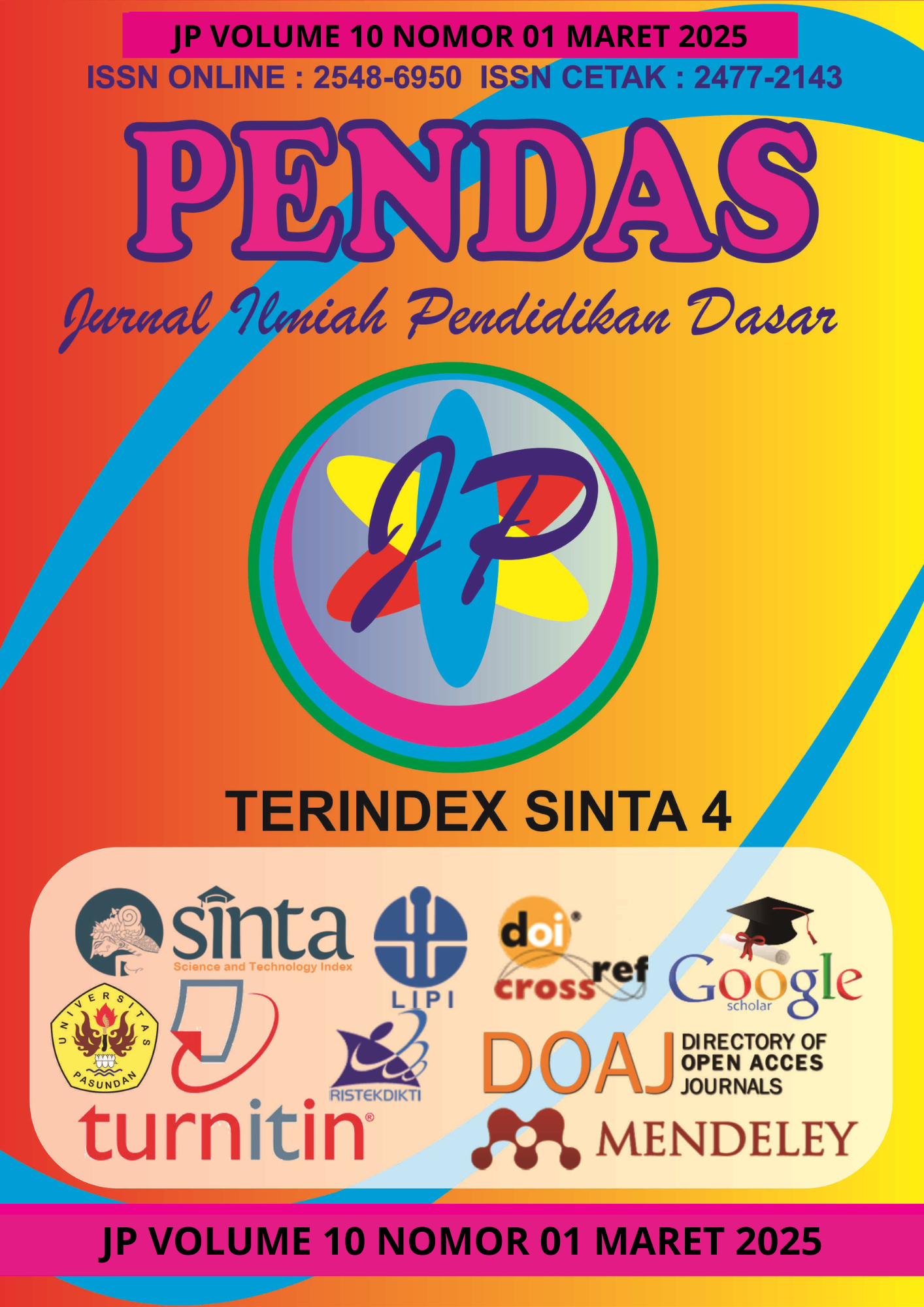STRATEGI KOMUNIKASI INTERPERSONAL GURU DALAM MENUMBUHKAN SELF-EFFICACY PESERTA DIDIK SEKOLAH DASAR
DOI:
https://doi.org/10.23969/jp.v10i01.22809Keywords:
interpersonal communication, self-efficacy, science learningAbstract
This research aims to describe the interpersonal communication strategies used by teachers in growing the self-efficacy of class V students at SD Negeri 139/I Sungai Buluh and to determine the level of students' self-efficacy during science learning. This research was carried out in the even semester of the 2024/2025 academic year. The research method used is qualitative with a phenomenological approach. Research data was collected through observation, interviews, and questionnaires as supporting data in determining students' level of self-efficacy. The strategies that teachers use to grow students' self-efficacy are by creating a pleasant learning atmosphere, holding discussion and question and answer sessions with students, being caring towards students by approaching and providing understanding to students who do not understand the material, motivating and appreciating each student's efforts, giving praise and encouragement to students, creating small discussion groups so that students become more active in learning, creating a class atmosphere where every student feels appreciated and has the same opportunity to participate, teachers also position themselves as friends so that students feel more free to discuss and ask questions. The supporting factors in implementing interpersonal communication strategies in growing students' self-efficacy are class mastery, use of learning media, use of technology, and facilities and infrastructure. Meanwhile, inhibiting factors and obstacles come from internal factors and external factors. Internal factors include students who are not ready to learn and need more attention. Meanwhile, external factors include students who do not bring tools and materials for making media, so it takes longer to find replacement tools and materials. The results of the research show that through the interpersonal communication strategies used by teachers, students are able to grow self-efficacy in science learning. This is shown by the results of the questionnaire that the level of student self-efficacy is in the high category with a result of 47.6%.
Downloads
References
Amar, M. F. (2024). Peran Kemampuan Komunikasi Interpersonal Pendidik dalam Menumbuhkan Self-Efficacy. Aafiyah: Jurnal Multidisiplin Ilmu, 2(1), 1–13.
Ananda, E. R., & Wandini, R. R. (2022). Analisis Kemampuan Literasi Matematika Siswa Ditinjau dari Self Efficacy Siswa. Jurnal Obsesi : Jurnal Pendidikan Anak Usia Dini, 6(5), 5113–5126.
Bandura, A. (2019). Self Efficacy the Exercise of Control. New York: W. H. Freeman and Company.
Hariyanto, D. (2021). Buku Ajar Pengantar Ilmu Komunikasi. Sidoarjo: Umsida Press.
Khairunnisa. (2022). “Efikasi Diri (Self-Efficacy) Siswa dalam Pembelajaran Matematika secara Online pada Kelas VI di MI Alwathoniyah”. Skripsi. Fakultas Agama Islam Universitas Muhammadiyah Jakarta: Jakarta.
Melenia, et al. (2022). Strategi Komunikasi Interpersonal Guru dan Siswa dalam Proses Pelaksanaan Asesmen Nasional Berbasis Komputer di SD Negeri 62 Oku. Jurnal Massa, 03(01), 1–11.
Muhammad, et al., (2021). Hubungan antara Efikasi Diri dengan Kemampuan Berpikir Kritis IPA Siswa. Jurnal Pendidiikan Dasar dan Menengah (Dikdasmen), 11-20.
Murtiningsih, et al. (2019). The Correlation Between Supervision of Headmaster and Interpersonal Communication With Work Ethos of The Teacher. European Journal of Education Studies, 6(1), 246–256.
Muzakki, M. Z. (2023). Strategi Guru Fiqih dalam Meningkatkan Self Efficacy Siswa pada Pembelajaran Fiqih di MAN Insan Cendekia. Skripsi. Fakultas Ilmu Tarbiyah dan Keguruan UIN Syarif Hidayatullah Jakarta: Jakarta.
Nursalim, et al. (2019) Psikologi Pendidikan. Bandung: PT. Remaja Rosdakarya.
Nuryana, et al. (2019). Pengantar Metode Penelitian Kepada Suatu Pengertian Yang Mendalam Mengenai Konsep Fenomenologi. Ensains Journal, 2(1), 19.
Patimah, S. dkk. (2024). Strategi Guru dalam Meningkatkan Keberanian Bertanya Siswa di Sekolah Dasar. Wahana Didaktika: Jurnal Ilmu Kependidikan, 22(2), 95-110.
Pemerintah Indonesia. (2003). Undang-Undang Repubik Indonesia Nomor 20 Tahun 2003 tentang Sistem Pendidikan Nasional. Jakarta: Depdiknas.
Pramulia, F. (2024). Strategi Guru dalam Implementasi Kurikulum Merdeka pada Mata Pelajaran IPAS di Kelas IV di SD. Skripsi. Fakultas Keguruan dan Ilmu Pendidikan Universitas Jambi: Jambi.
Putri, A. N., & Syukur, Y. (2023). Hubungan Komunikasi Interpersonal Guru BK dengan Motivasi Siswa Mengikuti Layanan Konseling. Jurnal Pendidikan Tambusai, 7(3), 25116–25123.
Rahayu, S. (2019). Desain Pembelajaran Aktif (Active Learnig). Yogyakarta: Ananta Vidya.
Rizki, et al. (2021). Analisis self efficacy sebagai dasar pengembangan sumber belajar mandiri untuk praktikum jarak jauh di LPTK. Jurnal Pendidikan Biologi Universitas Negeri Malang, 12(2), 71-80.
Saputri, K. A., & Sugiharto. (2020). Hubungan Antara Self-Efficcay dan Social Suppourt dengn Tingkat Stres pada Mahasiswa Akhir Penyusun Skripsi di FIP UNNES Tahun 2019. Journal of Guidance and Counseling, 4(1), 101- 122.
Sari, et al. (2022). Kemampuan Komunikasi Interpersonal Guru Bimbingan Konseling dalam Menumbuhkan Self-Efficacy Siswa di Sekolah Menengah Pertama. Bulletin of Counseling and Psychotherapy, 4(2), 533–539.
Simorangkir, M. R. R. (2019). Peran Kemampuan Komunikasi Interpersonal Pendidik dalam Menumbuhkan Self-Efficacy. Jurnal Dinamika Pendidikan, 12(3), 179-186.
Sugiyono. (2020). Metode Penelitian Kuantitatif, Kualitatif, dan R&D. Bandung: Alfabeta.
Zetina, E. (2021). Strategi Guru dalam Mengembangkan Self Efficacy dan Self Regulation Siswa untuk Menghafal Al-Qur’an di SMKIT Khoiru Ummah. Skripsi. Fakultas Tarbiyah IAIN Curup: Bengkulu.
Downloads
Published
Issue
Section
License
Copyright (c) 2025 Pendas : Jurnal Ilmiah Pendidikan Dasar

This work is licensed under a Creative Commons Attribution 4.0 International License.



















